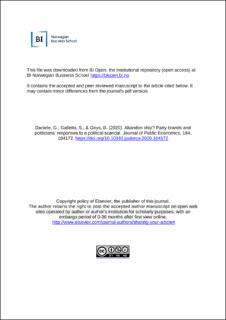Abandon Ship? Party Brands and Politicians’ Responses to a Political Scandal
Journal article, Peer reviewed
Accepted version
Permanent lenke
https://hdl.handle.net/11250/2762300Utgivelsesdato
2020Metadata
Vis full innførselSamlinger
- Scientific articles [2173]
Originalversjon
Journal of Public Economics, 2020, Volume 184, April, 104172 10.1016/j.jpubeco.2020.104172Sammendrag
Political scandals often trigger responses from voters and the implicated politicians. In this article, we extend the analysis to politicians who are only indirectly affected by a scandal through their affiliation with the involved party. Overcoming endogeneity concerns by analyzing the local implications of the largest national scandal in recent Italian history (“Clean Hands”), our main results show that local politicians withdraw support from incumbents in parties hit by Clean Hands – inducing early government dissolutions in such municipalities. Consistent with these municipality-level findings, we then illustrate that local politicians from the implicated parties exhibit lower re-running rates and higher rates of party switching in the short term. In the medium term, we find that corruption and voter turnout are lower in competitive municipalities ‘treated’ with a mayor from the implicated parties during Clean Hands. Moreover, medium-term upward career mobility of local politicians from the implicated parties benefited from party switching.

